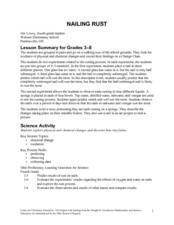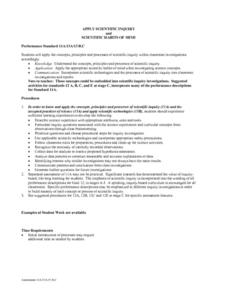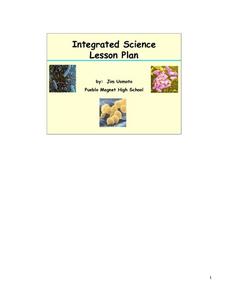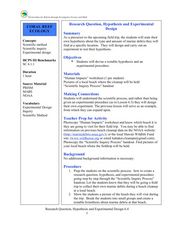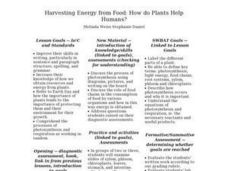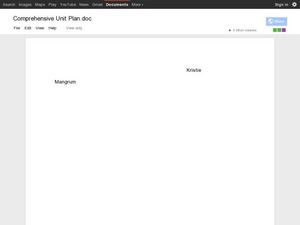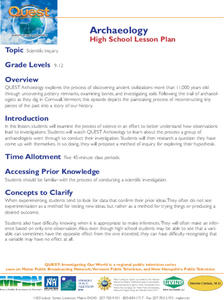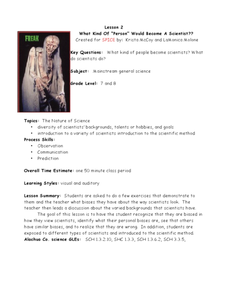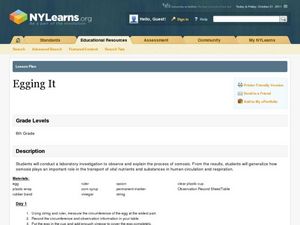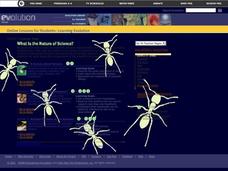Curated OER
Investigating Brass Instruments and Pitch
Students observe the sounds of different brass instruments in order to understand how to create different pitches. In this musical instructional activity, students create a "brass" instrument from everyday household objects. The students...
Curated OER
Bird Ecology Unit
Birds, plants, and vegetation, is there anything more lovely? There is! Engage your class in the scientific process, data collection, and data analysis. They stroll their campus observing and identifying various birds and plants,...
Curated OER
Introduction to Scientific Theory
Ninth graders explain how scientists set up investigations. In this scientific process instructional activity, 9th graders review the principles of the scientific method and use these skills to answer an open-ended question about how to...
Curated OER
Investigate Science Using Crayfish
Young scientists discover the importance of scientific investigation by observing live crayfish. They carefully observe the patterns of crayfish in different environments. Then they discuss their conclusions and define what all living...
Curated OER
Nailing Rust
When your upper elementary or middle school class is learning about chemical changes, these activities help demonstrate the concepts. In Part A, they submerge and place a nail partially underwater, then after a week they make...
Curated OER
Apply Scienctific Inquiry and Scientific Habits Of Mind
Students describe science experience with appropriate attributes, units, and tools. They formulate inquiry question associated with the science experiences and curricular concepts from observations through class brainstorming. Pupils...
Curated OER
Nearsightedness
Examine the processes scientists go through to develop their conclusions. Using the internet, research the problem of nearsightedness and identify anyone they know with the condition. Discover the debate in the science world on this...
Curated OER
Note Taking And Skills And Lab Reports
Young scholars perform simple and fun experiments to use the scientific method, take careful notes, and write a lab report. They first make and test a hypothesis about how many drops of water they can fit on the face of a penny and then...
Curated OER
Scientific Method Unit: Bacteria
Students discover how to apply the steps of the inquiry process through the study of bacteria. Working in groups of four, they cooperatively read an article about bacteria and complete a graphic organizer. Group members share with others...
Curated OER
Research Question, Hypothesis and Experimental Design
Learners discuss steps of the scientific process, as well as, observe a picture of the beach that they will visit. Students create a testable hypothesis about marine debris at the beach. In this science lesson, learners create a...
Curated OER
Charles Darwin
High schoolers research Charles Darwin and the process he used to develop his theory of evolution. They keep a journal about the skill of observation and make a newspaper of their learning.
Curated OER
Harvesting Energy from Food: How do Plants Help Humans?
Beginning botanists view slides of plant vascular tissue. They watch Magic School Bus Gets Planted, which you can find online, and then write a summary of what they have learned about plants. This lesson plan could be used with upper...
Curated OER
Growing A Coral Skeleton
Students research the growth of coral. For this coral polyps lesson, students simulate the growth of coral by using available materials to grow crystals. Students record observations in a scientific journal.
Curated OER
The Life Cycle of the Mealworm
Fourth graders provide a habitat for live mealworms and observe their life cycle. In this animal life cycle and scientific inquiry lesson, 4th graders create a habitat for a live mealworm and observe and record related data as it grows....
Curated OER
Archaeology
Students examine how observations lead to investigations, and how archaeologists conduct their investigation.
Curated OER
Home Sweet Home
Students enjoy investigating and becoming aware of the habitats around them. They record their observations in scientific journals. Data collection can take the form of a simple drawing or taking digital photos or videos in the habitats...
American Museum of Natural History
Draw a Monarch
Five steps walk scholars through the process of drawing a Monarch butterfly. Participants research the insect, make observations, trace, then color.
NASA
Let's Investigate Mars
Take your science class on a hypothetical field trip to Mars with an engaging astronomy lesson. After first learning about NASA's Mars rover missions, young scientists plan their own scientific investigations of Earth's...
Curated OER
How Does a Green Plant Grow?
Students of all ages can explore the question "how do seeds grow?", design an experiment to answer the question, predict the outcome of the experiment then conduct the experiment.
University of Kentucky
The Great Spider Debate
Poor, misunderstood spiders! They are feared, disrespected, and detested by many people, yet they do so many positive things. A great addition to any insect unit, learn about some of the more common spiders, while hopefully dispelling...
Curated OER
What Kind of "Person" Would Become a Scientist?
"Scientist Stereotypes" could be another name for this lesson! Begin by drawing from middle schoolers' preconceived notions and media portrayal of scientists, and then explain that anyone can be a scientist. Even though there is an...
Curated OER
Egging It
Sixth graders discover scientific processes by conducting an experiment in class. In this osmosis instructional activity, 6th graders utilize eggs, cooking ingredients, string and plastic cups to create an experiment in which they watch...
Curated OER
What is the Nature of Science?
Students examine videos of field researach to discover the components of the scientific process. Using forms, they conduct community surveys about the nature of science. They research the extinction of dinosaurs and compare...
Curated OER
Don't Just Do It - Talk About It!
Students investigate a scientific problem while documenting their research with a video camera. In this scientific method lesson, students hypothesize over a science question and conduct an investigation to find an answer....




